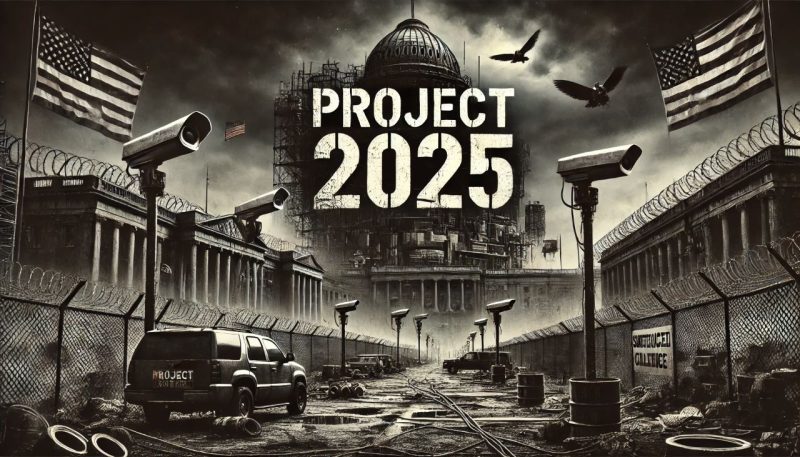
In the run-up to the 2024 presidential election, a conservative initiative known as Project 2025 has been gaining attention and stirring significant concern among various political and social groups.
Spearheaded by the Heritage Foundation, this initiative aims to reshape the federal government and implement a sweeping conservative agenda should the Republican nominee, presumably Donald Trump, win the presidency. Here’s why Project 2025 should be on every American’s radar.
What is Project 2025?
Project 2025 is an extensive plan crafted by the Heritage Foundation in collaboration with over 100 conservative organizations. It is designed to ensure that a new conservative administration can swiftly enact its policies from day one. The initiative focuses on four key areas:
- Restoring the Family: Advocating for traditional family structures and conservative social policies. Think Handsmaid Tale.
- Dismantling the Administrative State: Reducing the size and influence of federal agencies.
- Defending Sovereignty: Implementing stringent immigration and border control measures.
- Securing Individual Rights: Promoting conservative interpretations of constitutional rights.
Key Figures Behind Project 2025
Trump claims he knows nothing about the people behind Project 2025, but of course this is a lie. Project 2025 is not just an abstract plan but the product of coordinated efforts by a network of influential conservatives, many of whom served in the Trump administration. These individuals bring their experience and ideological fervor to this ambitious initiative. Here are the some of the most prominent figures involved:

- Stephen Miller
- Role: Former Senior Advisor to President Trump
- Description: Known for his strict immigration policies and influential role in crafting the Trump administration’s hardline stances, Miller is a central figure in Project 2025, pushing for stringent immigration reforms and conservative social policies.
- Kevin D. Roberts
- Role: President of the Heritage Foundation
- Description: As the head of the Heritage Foundation, Roberts has been pivotal in organizing and promoting Project 2025, framing it as a blueprint to transform America into a conservative stronghold.
- Paul Dans
- Role: Director of Project 2025’s Presidential Transition Project
- Description: A former Trump administration official, Dans is responsible for coordinating the detailed plans for the first 180 days of a new administration, emphasizing the need to replace federal workers with loyal conservatives.
- Gene P. Hamilton
- Role: Former DOJ Official under Trump
- Description: Hamilton played a key role in implementing immigration policies during the Trump administration and is now focused on restructuring the Department of Justice to align with conservative priorities under Project 2025.
- Russ Vought
- Role: Former Director of the Office of Management and Budget (OMB)
- Description: Vought has been involved in crafting fiscal policies that support the conservative agenda, advocating for significant cuts to social programs and regulatory rollbacks to foster a more conservative federal budget.
These individuals, leveraging their extensive experience and deep connections within the conservative movement, are driving Project 2025’s vision of a dramatically restructured and distopian American government and society.
Dismantling Government Agencies
One of the most alarming aspects of Project 2025 is its proposal to reclassify tens of thousands of federal civil service workers as political appointees. This change would allow the administration to replace career public servants with individuals loyal to the president, effectively consolidating executive power and undermining the independence of federal agencies.
Impact on Civil Rights and Social Programs
Project 2025 also poses significant threats to civil rights and social programs:
- Reproductive Rights: The plan includes aggressive measures to restrict abortion access, defund Planned Parenthood, and promote anti-abortion policies at the federal level.
- LGBTQ+ Rights: It seeks to eliminate protections for LGBTQ+ individuals, including removing terms like “sexual orientation” and “gender identity” from federal regulations.
- Social Safety Nets: The initiative proposes cuts to programs like Medicaid, food assistance, and Head Start, which support millions of low-income Americans.
Environmental and Economic Policies
Project 2025 outlines drastic changes to environmental and economic policies:
- Climate Change: It advocates for rolling back climate change regulations and promoting fossil fuel production, which could have severe environmental repercussions.
- Economic Measures: The plan includes tax cuts and deregulation, but critics argue these policies disproportionately benefit the wealthy and could widen economic inequality.
Undermining Democracy
Perhaps the most troubling aspect of Project 2025 is its potential to undermine democratic institutions. By restructuring the Department of Justice to prioritize the prosecution of election-related offenses according to partisan lines, the initiative could erode public trust in the electoral process. Additionally, proposals to deadlock the Federal Election Commission and manipulate election rules could significantly weaken the integrity of federal elections.
The Broader Implications
Project 2025’s vision of America aligns closely with the principles of Christian nationalism, promoting a society where conservative Christian values dominate public life and policy. Critics warn that this could lead to increased discrimination and a rollback of decades of progress in civil rights and social justice.
Conclusion
Project 2025 represents a concerted effort by the conservative movement to reshape American society according to its principles. While its proponents argue that it aims to restore traditional values and reduce government overreach, the potential consequences for civil rights, social programs, and democratic institutions are profound and far-reaching. As the 2024 election approaches, it is crucial for Americans to be informed about these plans and their implications for the future of the nation.
